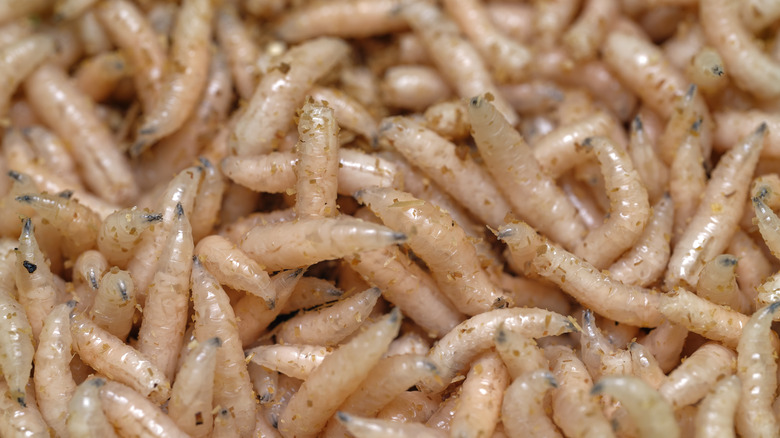The Unsettling Number Of Maggots Allowed In Canned Mushrooms
You'd hope that finding maggots in your food would just be a Halloween trick, like the old spaghetti entrails or peeled grape eyeballs of our youths, but unfortunately, they're a genuine problem, as are many other disgusting contaminants. The U.S. Food and Drug Administration (FDA) has strict rules regarding what they call "food defects." Still, they are more lenient than you might want to hear, as CNN reports that the FDA considers it "economically impractical to grow, harvest, or process raw products that are totally free of non-hazardous, naturally occurring, unavoidable defects."
In short, that means you're allowed to have some really nasty stuff in there, just not too much. For example, ketchup and many other condiments often contain insect eggs and body fragments. Live Science notes that the FDA has regulations on the limits of rodent poop, rodent fur, and even cigarette butts, and unfortunately for us, those limits are often above zero. However, few foods are allowed to contain whole insects (just their parts), except in microscopic cases like maggots and mites. They're especially problematic in canned produce like mushrooms.
It's more than maggots
First, let's talk about what maggots really are. Per Healthline, they are the legless larval stage of the common fly, and when you think about what abundant pests flies can be in our lives, you can only imagine how many larvae they've got wriggling around out there. The good news is that maggots themselves are safe to eat, but they can bear diseases if they've been exposed to rotting plant or animal flesh. That's why you don't want to eat fruit infested with maggots.
Generally, though, CNN reports that maggots and insect parts in food pose extremely little risk to your health. But how many maggots could there be in that can of mushrooms? The FDA inspects canned mushrooms in batches of at least six 100-gram portions. The FDA Compliance Policy Guide explains that the average of these portions must have less than 20 maggots, less than five of which are allowed to exceed two millimeters.
They are even more generous when it comes to mites, which Everyday Health points out are not insects, but arthropods closely related to spiders and ticks. Per FDA guidelines, the average 100-gram portion of mushrooms must have less than 75 mites. In other words, your mushrooms could have 74 mites. Maybe it's a good time to start eating more fresh vegetables.

